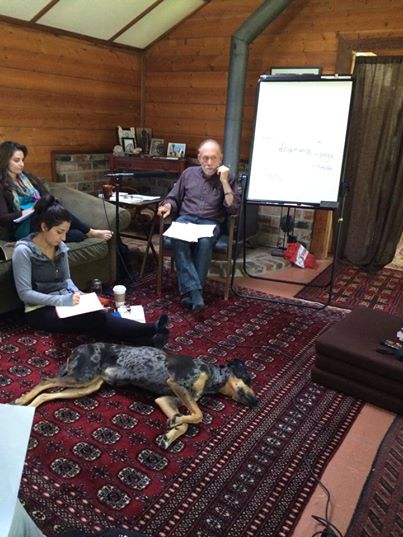Nonviolence and the Meaning of Life Seminar
On Saturday, February 22, 2014, a small group assembled in the Metta Center’s office in Petaluma to support us as we created video for Michael Nagler’s “Nonviolence and the Meaning of Life” Seminar (soon to be available on the web in our Self-Study section, as well as integrated into our Certificate in Nonviolence Studies). Michael taught this course for over 15 years as a Sophomore Seminar at UC Berkeley and it was one of his favorite courses. We are happy that we can share it with a new audience!
Here are some highlights of our discussion, shared by the group (Patti, Jill, Tal, Robin, Lukas, Peijman, Maja, Mica, Cecilia, Fatima, Stephanie and Fancy [the dog]…and Michael):
We began by reading Yeats’ poem here…
and then went into the following discussion….
There is a demonstrable need for meaning in life. Evidence shows that lack of meaning is correlated even with fatal heart conditions; it can be seen as a root cause for various forms of violence, including the physical and psychological suffering in our world.
We discovered that there are “three faces of meaning:” real meaning, pseud0-meaning and partial meaning. There is nothing wrong with partial meanings, but if you are too attached to them, they can keep you from evolving into meaning, and likely to become pseudo-meanings. An example of a pseudo-meaning is satisfaction from bonding among soldiers in war, along with the sense of ‘service’ to a higher cause. You can tell that they are pseudo-meanings because of their strict limitations, such as needing to have an enemy in order to have service, bonding and sacrifice. In other words, something is not a real meaning if it comes at the expense of another or is any way a form of violence.
To deny that our life has purpose is to deny our connection with the planet, since we see that all life is purpose-driven.
Evolution has reached a qualitative stage such that to further fulfill itself it does not require changes of the body; it must, and will now unfold in the domain of consciousness. As Cecilia said, “we have reached our highest physical form and it is time to go deeper,” and Stephanie added, “it’s time to endow that human form with dignity.” (#dignity)
We explored the concepts of dharma (purpose), yuga-dharma (purpose of an age), sva-dharma (individual’s purpose), and nimisa dharma (purpose of the moment), which is to divide dharma up into its manifestations in social space and time. Ahimsa paramo dharma (nonviolence is the highest dharma), was explored as a guidepost for all the sub-dharmas.
We see compassion as deeper than emotion, what we might call a “spiritual force,” and when you are in that state and want to act, you have to find nonviolence because it’s the only way to put that state into action without violating it.
By turning toward our suffering and looking at our own obstacles, we can identify the greater needs in our communities. From there, we can begin to develop more humane and compassionate structures which are aligned with the inherent purpose of nature.
Nonviolence, we said, is often inconvenient. And currently a culture of convenience creates suffering and obstructs further evolution toward the realization of life’s meaning. Sadly, we admitted, the greatest convenience at this time is often to deny the suffering around us, including our own. In order to create a more nonviolent world, we can work to make the right choice become the convenient choice. You can evaluate a culture by how much it inhibits or facilitates people discovering the meaning of life, from finding their sva-dharma as individuals within the yuga-dharma of the age and, in turn, the ultimate dharma of all life (ahimsa).
Peijman thought to add some questions to raise in discussion with others on this topic:
- Do you ever shut-down when having a thought that leads to connection, and then do you ever self-censor to get back in line with the dominant paradigm?
Jill added, with much feeling:
- The problems seem so big, and we can seem so small, how can we avoid demoralization? Michael proposed: numbers don’t matter that much in the world of consciousness; also, remember “work” vs. work: that we do not always see the results of our actions. We can have the faith that a special power resides in discovering our contribution.
We began to end the discussion by reading this Rumi poem, but it is of course, an on-going matter. Final thoughts…love–not merely an emotion– is one way of seeing the ultimate reality acting through all things and people. That is, to the extent that we don’t let our private self obstruct it.
Lots of food for thought!
Here are the three videos of this seminar.










[…] By stephanie […]
Nice. I like the dog position in the foreground of the picture. While reading the paragraph about dharmas the old clown “Not Two” giggled and uttered something like, “meh” (under the breath). But ya gotta understand “Not Two”. The cruel joke is that he carries those labels as his first and middle names and his last name is “Ironic”. Not Two Ironic. That fool’s got some baggage. 😉
I wonder who the Irish airman is addressing? Presumably, it is not his notional enemies or his compatriots.
Just saying. The You Tube video is available: https://www.youtube.com/watch?v=UXGfCfrFTcQ